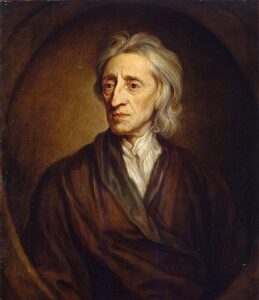Locke on Natural Rights and Slavery
In chapters II-IV of John Locke’s Second Treatise of Government, written in 1689, Locke argued all men were born into a state of “perfect freedom” and “equality.” In this state, all people had “natural rights” to life, liberty, and possessions that could not be taken away. Locke did not distinguish who was entitled to these rights based on race, sex, or creed, thus it appeared these rights applied evenly to all mankind. Locke denounced slavery as an infringement on a man’s natural rights, explaining that the “natural liberty of man is to be free from any superior power on earth.”
Compared to Aristotle, Locke’s view on slavery represented a clear shift in thought. Locke’s “natural rights” contradicted Aristotle’s hypothesis that some people were naturally born slaves. In fact, Aristotle did not entertain the idea that, from birth, people were entitled to liberty. Perhaps this revelation was a sign of the times. Aristotle lived during a time when slavery was a widely accepted practice and to question it would have been revolutionary. However, Locke lived during the early years of the Enlightenment at a time when slavery began to be questioned.
Though Enlightenment thinking rested on Locke’s idea of natural rights, many did not practice what they preached. Instead, Africans were sold into slavery, women were not treated as equals and Native Americans were forced to relocate as the colonists settled on their land. This hypocritical reality raises many considerations about how Locke’s words were interpreted at the time. Perhaps people understood their hypocritical practices but chose to ignore them for convenience’s sake. However, it remains possible that people understood equality to apply differently depending on race, sex, or creed.
Historian Holly Brewer points out in her article that Locke owned stock in the Royal African Company, which ran the slave trade in England (Brewer, “Slavery Entangled Philosophy”). He also wrote the Constitution of Carolina, which explicitly supported slavery. However, Brewer argues that both ties were products of employment not personal statements by Locke. This revelation shows that perhaps the roles of women, slaves, and Native Americans were so engrained in society that people did not see the hypocrisy of their practices. While it remains difficult to see how anyone could have justified such inequality, perhaps it was more a product of ignorance rather than ill-intent.
Excerpt from John Locke’s Second Treatise on Government, read by Jordyn Ney
Music by: Luke Faulkner (Youtube) and Nick Rickert

